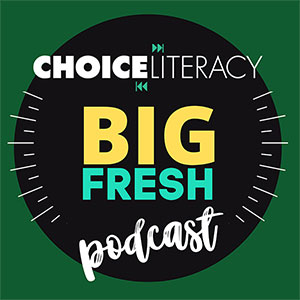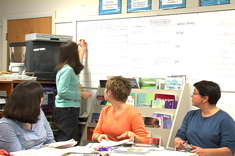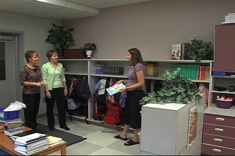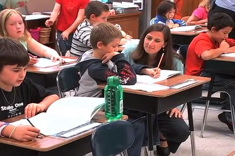Franki Sibberson chats with Jennifer Allen about the joys and challenges of working with new teachers. A transcript is below the player.

Franki Sibberson: What have you found to be successful in working with newer or early career teachers?
Jennifer Allen: Working with new teachers is really about providing them with time to observe their peers, and so they can see lots of models, and getting them in lots of classrooms, but first and foremost I think it's so important to build relationships with the teachers so that there's a level of trust.
One of my goals in terms of working with new teachers is really supporting them to be individuals, so that using that gradual release model to help them become more independent and sustain their ideas over time, and that's one of the reasons I work with new teachers over several years. It's to really help them with that sustainability factor. It's easy to work with them for one year, and then where things aren't really entrenched and ingrained in their practice, and I think one of the things we really want is to support new teachers so that we can gradually release, and that they're confident in terms of their own practices.
Franki: You've really thought hard about your year as a whole with beginning teachers. Certain times that new teachers need different kinds of support. Can you talk a little bit about that?
Jen: I think of the year as a whole and I find that there's a lot of things in terms of support, in terms of working with new teachers that just fall sequentially throughout the year. Really helping them launch the year; getting into their classroom; supporting them with room environment. Early on we move right into helping new teachers administer fall assessments to their students, and then helping them interpret and analyze those assessments, and really working with them throughout the year then to say how do the assessments support and guide instruction? How do we take that and map out our year in terms of instruction? We work through supporting new teachers with parent/teacher conferences, and then as you move throughout the years, and you get to the spring and it's spring assessments and wrapping up the school year, and again, looking at student progress and how students have progressed throughout the year.
Franki: So do you feel like it's like the same amount of time, like that same amount of support the teachers need throughout the year, or are there certain times that they need more or less support?
Jen: I think that they actually need it throughout the entire year. I think there's so much that new teachers need to learn within their first few years within a school system. I mean, as soon as you get into the school the students come. Once you set up the environment, then you have assessments, and before you know it you have parent/teacher conferences. You have state assessments, and there's a strong pulse of what needs to be done throughout the entire year.
Franki: So it follows the cycle of the school year.
Jen: It follows a cycle, and just when you feel like you're done, it's all the cumulative folders and wrap-up that we take for granted about how we wrap up a school year.
Franki: Any unique challenges with beginning teachers?
Jen: What I'm finding is the biggest challenge in terms of working with beginning teachers is really the roadblocks of behavior management, that behavior management can really be an obstacle, a roadblock getting in the way of instructional practices, where veteran teachers pretty much have behavior management under control.
Franki: So do you feel like you spend a lot of time with that the first couple years?
Jen: I'm finding I'm spending a lot of time on behavior management with new teachers, and that wasn't something I had expected in the beginning when I started coaching, but we find that if we can't find the strategies for behavior management, it's really hard to focus in on student instruction.
Franki: Anything new you're learning about working with teachers and your coaching that you want to share?
Jen: I think I'm constantly learning how passionate teachers are in terms of their lifelong learning, and that how important it is to listen and stand back, and to learn from teachers and to be responsive to what their needs are and not to be quick in terms of what one thinks they need; that teachers are pretty self-directed, and I guess I see my role as a coach is to really be there as a resource and to help them find the resources that they need to direct their own learning.







